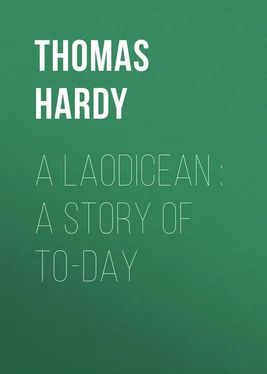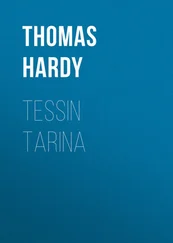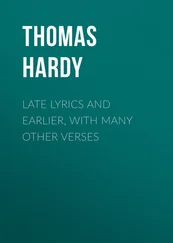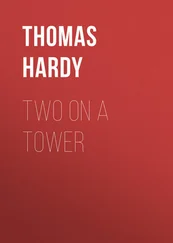Thomas Hardy - A Laodicean - A Story of To-day
Здесь есть возможность читать онлайн «Thomas Hardy - A Laodicean - A Story of To-day» — ознакомительный отрывок электронной книги совершенно бесплатно, а после прочтения отрывка купить полную версию. В некоторых случаях можно слушать аудио, скачать через торрент в формате fb2 и присутствует краткое содержание. Жанр: foreign_antique, foreign_prose, на английском языке. Описание произведения, (предисловие) а так же отзывы посетителей доступны на портале библиотеки ЛибКат.
- Название:A Laodicean : A Story of To-day
- Автор:
- Жанр:
- Год:неизвестен
- ISBN:нет данных
- Рейтинг книги:4 / 5. Голосов: 1
-
Избранное:Добавить в избранное
- Отзывы:
-
Ваша оценка:
- 80
- 1
- 2
- 3
- 4
- 5
A Laodicean : A Story of To-day: краткое содержание, описание и аннотация
Предлагаем к чтению аннотацию, описание, краткое содержание или предисловие (зависит от того, что написал сам автор книги «A Laodicean : A Story of To-day»). Если вы не нашли необходимую информацию о книге — напишите в комментариях, мы постараемся отыскать её.
A Laodicean : A Story of To-day — читать онлайн ознакомительный отрывок
Ниже представлен текст книги, разбитый по страницам. Система сохранения места последней прочитанной страницы, позволяет с удобством читать онлайн бесплатно книгу «A Laodicean : A Story of To-day», без необходимости каждый раз заново искать на чём Вы остановились. Поставьте закладку, и сможете в любой момент перейти на страницу, на которой закончили чтение.
Интервал:
Закладка:
‘I am going to restore the castle.’
‘What, all of it?’ said Somerset, astonished at the audacity of such an undertaking.
‘Not the parts that are absolutely ruinous: the walls battered by the Parliament artillery had better remain as they are, I suppose. But we have begun wrong; it is I who should ask you, not you me… I fear,’ she went on, in that low note which was somewhat difficult to catch at a distance, ‘I fear what the antiquarians will say if I am not very careful. They come here a great deal in summer and if I were to do the work wrong they would put my name in the papers as a dreadful person. But I must live here, as I have no other house, except the one in London, and hence I must make the place habitable. I do hope I can trust to your judgment?’
‘I hope so,’ he said, with diffidence, for, far from having much professional confidence, he often mistrusted himself. ‘I am a Fellow of the Society of Antiquaries, and a Member of the Institute of British Architects – not a Fellow of that body yet, though I soon shall be.’
‘Then I am sure you must be trustworthy,’ she said, with enthusiasm. ‘Well, what am I to do? – How do we begin?’
Somerset began to feel more professional, what with the business chair and the table, and the writing-paper, notwithstanding that these articles, and the room they were in, were hers instead of his; and an evenness of manner which he had momentarily lost returned to him. ‘The very first step,’ he said, ‘is to decide upon the outlay – what is it to cost?’
He faltered a little, for it seemed to disturb the softness of their relationship to talk thus of hard cash. But her sympathy with his feeling was apparently not great, and she said, ‘The expenditure shall be what you advise.’
‘What a heavenly client!’ he thought. ‘But you must just give some idea,’ he said gently. ‘For the fact is, any sum almost may be spent on such a building: five thousand, ten thousand, twenty thousand, fifty thousand, a hundred thousand.’
‘I want it done well; so suppose we say a hundred thousand? My father’s solicitor – my solicitor now – says I may go to a hundred thousand without extravagance, if the expenditure is scattered over two or three years.’
Somerset looked round for a pen. With quickness of insight she knew what he wanted, and signified where one could be found. He wrote down in large figures —
100,000.
It was more than he had expected; and for a young man just beginning practice, the opportunity of playing with another person’s money to that extent would afford an exceptionally handsome opening, not so much from the commission it represented, as from the attention that would be bestowed by the art-world on such an undertaking.
Paula had sunk into a reverie. ‘I was intending to intrust the work to Mr. Havill, a local architect,’ she said. ‘But I gathered from his conversation with you to-day that his ignorance of styles might compromise me very seriously. In short, though my father employed him in one or two little matters, it would not be right – even a morally culpable thing – to place such an historically valuable building in his hands.’
‘Has Mr. Havill ever been led to expect the commission?’ he asked.
‘He may have guessed that he would have it. I have spoken of my intention to him more than once.’
Somerset thought over his conversation with Havill. Well, he did not like Havill personally; and he had strong reasons for suspecting that in the matter of architecture Havill was a quack. But was it quite generous to step in thus, and take away what would be a golden opportunity to such a man of making both ends meet comfortably for some years to come, without giving him at least one chance? He reflected a little longer, and then spoke out his feeling.
‘I venture to propose a slightly modified arrangement,’ he said. ‘Instead of committing the whole undertaking to my hands without better proof of my ability to carry it out than you have at present, let there be a competition between Mr. Havill and myself – let our rival plans for the restoration and enlargement be submitted to a committee of the Royal Institute of British Architects – and let the choice rest with them, subject of course to your approval.’
‘It is indeed generous of you to suggest it.’ She looked thoughtfully at him; he appeared to strike her in a new light. ‘You really recommend it?’ The fairness which had prompted his words seemed to incline her still more than before to resign herself entirely to him in the matter.
‘I do,’ said Somerset deliberately.
‘I will think of it, since you wish it. And now, what general idea have you of the plan to adopt? I do not positively agree to your suggestion as yet, so I may perhaps ask the question.’
Somerset, being by this time familiar with the general plan of the castle, took out his pencil and made a rough sketch. While he was doing it she rose, and coming to the back of his chair, bent over him in silence.
‘Ah, I begin to see your conception,’ she murmured; and the breath of her words fanned his ear. He finished the sketch, and held it up to her, saying —
‘I would suggest that you walk over the building with Mr. Havill and myself, and detail your ideas to us on each portion.’
‘Is it necessary?’
‘Clients mostly do it.’
‘I will, then. But it is too late for me this evening. Please meet me to-morrow at ten.’
At ten o’clock they met in the same room, Paula appearing in a straw hat having a bent-up brim lined with plaited silk, so that it surrounded her forehead like a nimbus; and Somerset armed with sketch-book, measuring-rod, and other apparatus of his craft.
‘And Mr. Havill?’ said the young man.
‘I have not decided to employ him: if I do he shall go round with me independently of you,’ she replied rather brusquely.
Somerset was by no means sorry to hear this. His duty to Havill was done.
‘And now,’ she said, as they walked on together through the passages, ‘I must tell you that I am not a mediaevalist myself; and perhaps that’s a pity.’
‘What are you?’
‘I am Greek – that’s why I don’t wish to influence your design.’
Somerset, as they proceeded, pointed out where roofs had been and should be again, where gables had been pulled down, and where floors had vanished, showing her how to reconstruct their details from marks in the walls, much as a comparative anatomist reconstructs an antediluvian from fragmentary bones and teeth. She appeared to be interested, listened attentively, but said little in reply. They were ultimately in a long narrow passage, indifferently lighted, when Somerset, treading on a loose stone, felt a twinge of weakness in one knee, and knew in a moment that it was the result of the twist given by his yesterday’s fall. He paused, leaning against the wall.
‘What is it?’ said Paula, with a sudden timidity in her voice.
‘I slipped down yesterday,’ he said. ‘It will be right in a moment.’
‘I – can I help you?’ said Paula. But she did not come near him; indeed, she withdrew a little. She looked up the passage, and down the passage, and became conscious that it was long and gloomy, and that nobody was near. A curious coy uneasiness seemed to take possession of her. Whether she thought, for the first time, that she had made a mistake – that to wander about the castle alone with him was compromising, or whether it was the mere shy instinct of maidenhood, nobody knows; but she said suddenly, ‘I will get something for you, and return in a few minutes.’
‘Pray don’t – it has quite passed!’ he said, stepping out again.
But Paula had vanished. When she came back it was in the rear of Charlotte De Stancy. Miss De Stancy had a tumbler in one hand, half full of wine, which she offered him; Paula remaining in the background.
Читать дальшеИнтервал:
Закладка:
Похожие книги на «A Laodicean : A Story of To-day»
Представляем Вашему вниманию похожие книги на «A Laodicean : A Story of To-day» списком для выбора. Мы отобрали схожую по названию и смыслу литературу в надежде предоставить читателям больше вариантов отыскать новые, интересные, ещё непрочитанные произведения.
Обсуждение, отзывы о книге «A Laodicean : A Story of To-day» и просто собственные мнения читателей. Оставьте ваши комментарии, напишите, что Вы думаете о произведении, его смысле или главных героях. Укажите что конкретно понравилось, а что нет, и почему Вы так считаете.












